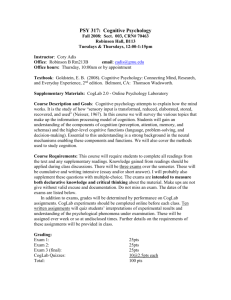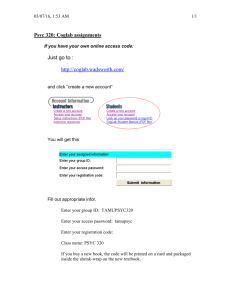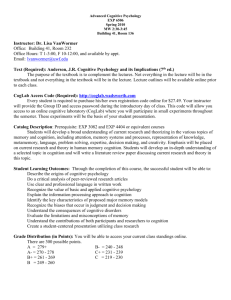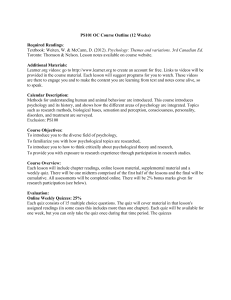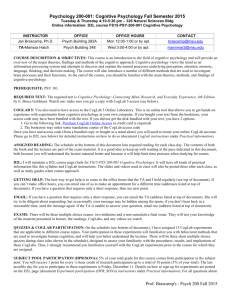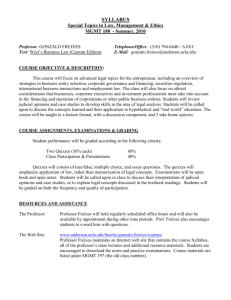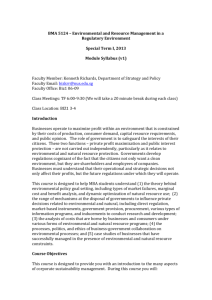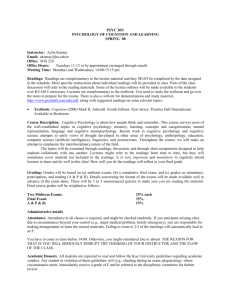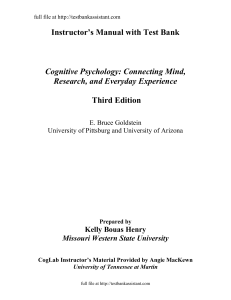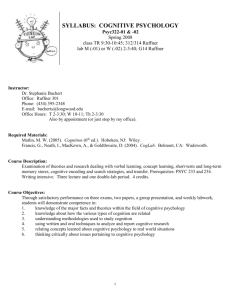Syllabus Psychology 325: Cognitive Psychology
advertisement
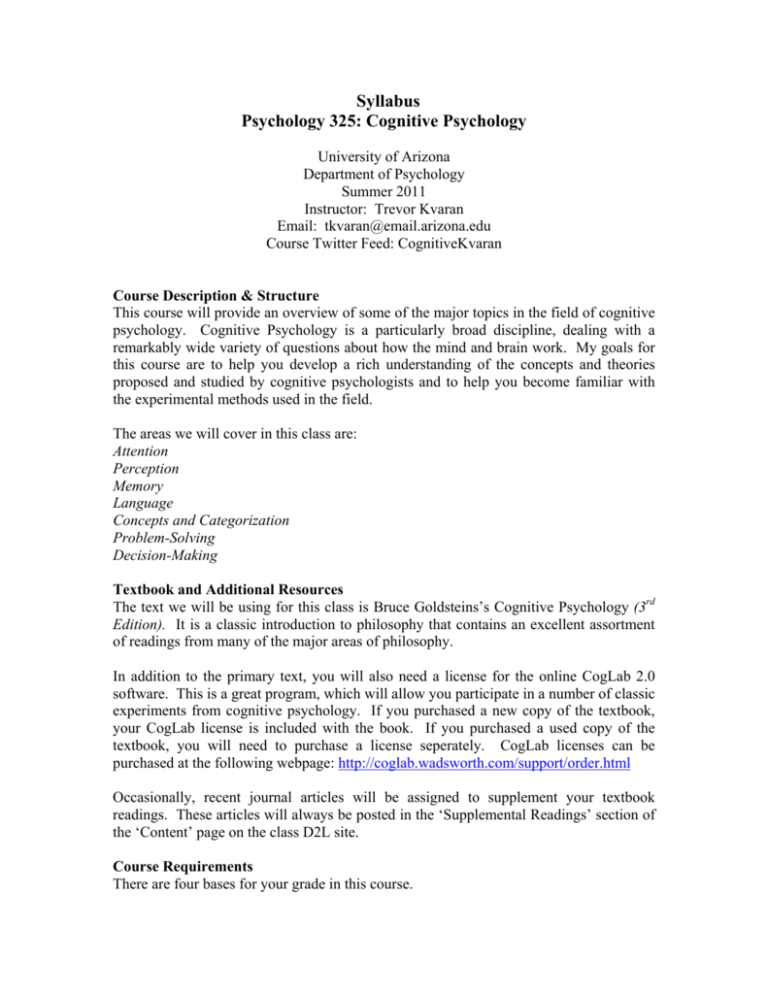
Syllabus Psychology 325: Cognitive Psychology University of Arizona Department of Psychology Summer 2011 Instructor: Trevor Kvaran Email: tkvaran@email.arizona.edu Course Twitter Feed: CognitiveKvaran Course Description & Structure This course will provide an overview of some of the major topics in the field of cognitive psychology. Cognitive Psychology is a particularly broad discipline, dealing with a remarkably wide variety of questions about how the mind and brain work. My goals for this course are to help you develop a rich understanding of the concepts and theories proposed and studied by cognitive psychologists and to help you become familiar with the experimental methods used in the field. The areas we will cover in this class are: Attention Perception Memory Language Concepts and Categorization Problem-Solving Decision-Making Textbook and Additional Resources The text we will be using for this class is Bruce Goldsteins’s Cognitive Psychology (3rd Edition). It is a classic introduction to philosophy that contains an excellent assortment of readings from many of the major areas of philosophy. In addition to the primary text, you will also need a license for the online CogLab 2.0 software. This is a great program, which will allow you participate in a number of classic experiments from cognitive psychology. If you purchased a new copy of the textbook, your CogLab license is included with the book. If you purchased a used copy of the textbook, you will need to purchase a license seperately. CogLab licenses can be purchased at the following webpage: http://coglab.wadsworth.com/support/order.html Occasionally, recent journal articles will be assigned to supplement your textbook readings. These articles will always be posted in the ‘Supplemental Readings’ section of the ‘Content’ page on the class D2L site. Course Requirements There are four bases for your grade in this course. 1. Quizzes: There will be weekly quizzes during the semester. These quizzes will consist of multiple choice and true/false questions and will be administered on the course website. Quizzes will be available under the ‘Quizzes’ page on the course website. These quizzes will be available from noon on Friday until 11:59 p.m. on Sunday of whatever week the quiz is given. Quizzes will be worth 20 points each. 2. CogLab Experiments: Cognitive psychology is an experimental science. As such, I believe that it is necessary to experience the sorts of experiments that are used to help us understand human cognition. The CogLab software that is bundled with your textbook is an excellent way to participate in a wide range of experiments. Each week you will participate in two experiments. Participation in both experiments must be completed by Thursday at 11:59 p.m. each week. 3. Discussion: A crucial aspect of psychology is sharing and discussing your thoughts, ideas, and research with other people. In order to introduce you to this aspect of psychology, you will be required to post discussion commentaries on the course message board. Commentaries should be approximately 1-2 paragraphs in length and can be written on anything in the assigned readings or the CogLab experiments. These commentaries can take the form of a question you have about something from the readings or experiments, your thoughts on how a topic or experiment we learn about can be applied to the real world, a point in the reading that you agreed with or found particularly interesting, or a general thought that was brought about by one of the readings. In addition to your commentary, you will be required to reply to at least two of your fellow students’ commentaries. These replies can be relatively short, but should address and expand on the point(s) made in the original commentary. Although you are only required to reply twice during each discussion, you are encouraged to post as often as you would like in the message boards. Discussions will be required each week (see the schedule below or the calendar on the course website for specific dates). Each discussion will be worth a total of 20 points. 15 points will come from your commentary and 5 points will come from your responses to other students. 4. Midterm and Final Exams: You will have two exams in this course. Exams will consist of two sections. The first section will consist of several short answer questions. These questions should take approximately 1-3 sentences to answer. The second section of the midterm will consist of 2 short essays. You will be provided with several essay questions dealing with the topics that we have read about and discussed in class and you will pick any two to answer. These essays should be answerable in approximately 250 words, or 1 page double-spaced. The midterm will be worth 100 points, with each of the two sections worth 50 points. Assignments & Grading Assignment Quizzes Points Due Date Quiz 1 Quiz 2 Quiz 3 Quiz 4 20 points 20 points 20 points 20 points Discussion 1 Discussion 2 Discussion 3 Discussion 4 CogLab Participation Week 1 Week 2 Week 3 Week 4 20 points 20 points 20 points 20 points Discussion 10 points 10 points 10 points 10 points Midterm Exam Final Exam 100 points 100 points Total 400 points Grading Scale by Percentage A: 90-100% B: 80-89% C: 70-79% D: 60-69% F: 59% or less Grading Scale by Points (out of 400) A: 360-400 B: 320-359 C: 280-319 D: 240-279 F: 239 or less Course Schedule This course will be broken into four modules. Each module will take one week to complete. Below is a general schedule for the semester, although changes may be made to this schedule if necessary. Week 1 (June 6 – June 12) Module 1: Attention & Perception Readings 1. Goldstein Chapter 3 (Pages 46-79) 2. Goldstein Chapter 4 (Pages 80-113) Assignments 1. Quiz 1 2. Discussion 1 3. CogLab Participation 1 Experiment 1: Change Detection Experiment 2: Muller-Lyer Illusion Week 2 (June 13 – June 19) Module 2: Long-Term & Short-Term Memory Readings 1. Goldstein Chapter 5 (Pages 114-145) 2. Goldstein Chapter 6 (Pages 146-169) 3. Goldstein Chapter 7 (Pages 170-201) Assignments 1. Quiz 2 2. Discussion 2 3. CogLab Participation 2 Experiment 1: Memory Span Experiment 2: Serial Position Week 3 (June 20 – June 26) Module 3: Knowledge & Language Readings 1. Goldstein Chapter 9 (Pages 238-267) 2. Goldstein Chapter 11 (Pages 292-323) Assignments 1. Quiz 3 2. Discussion 3 3. CogLab Participation 3 Experiment 1: Prototypes Experiment 2: Lexical Decision 4. Midterm Exam Week 4 (June 27 – July 3 ) Module 4: Problem-Solving & Decision-Making Readings 1. Goldstein Chapter 12 (Pages 324-357) 2. Goldstein Chapter 13 (Pages 358-390) Assignments 1. Quiz 1 2. Discussion 4 3. CogLab Participation 4 Experiment 1: Monty Hall Experiment 2: Risky Decisions Week 5 (July 4 - July 7) **Final Exam** Due by 11:59 p.m. on July 7th.
